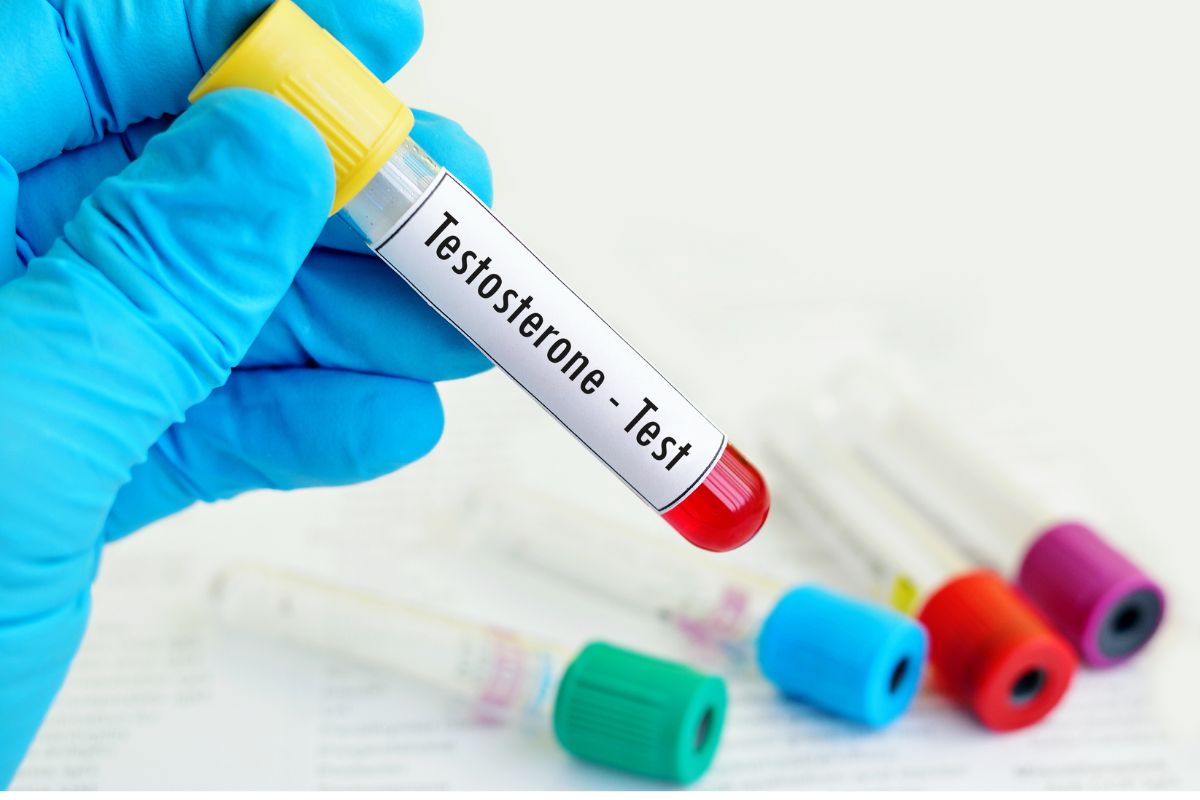Everyone knows that the only way to get pregnant is for a sperm to enter a vagina, travel through the cervix and the womb, and fertilize an egg.

However, science has proven that biological sex and gender are not the same thing. Science has also proven that there are countless ways to get pregnant without heterosexual penetrative sex.
Transgender men are individuals who were assigned female at birth, but live as a man today. Not every trans person will undergo the same gender surgeries and treatments, such as gender reassignment surgery and hormone replacement therapy (HRT).
So, does this mean that transgender men can get pregnant just like a cisgender woman? How can transgender men get pregnant?
If you’re curious about the logistics of pregnancy as a transgender man, here’s everything you need to know.
What Is A Transgender Man?
Firstly, let’s take a look at what defines a transgender man. Put simply, a transgender man is someone who was born a biological woman and assigned female at birth, but their gender does not match their sex.
This is the opposite to a cisgender man, who is assigned male at birth and their gender matches their sex.
While it would be easy to assume that this means transgender men will always change their reproductive organs to match those of a cisgender man, this isn’t always the case.
Gender reassignment surgeries are expensive and time-consuming, and not always something that the individual wants to undergo.
This means that there are some transgender men who maintain their female reproductive organs, even though they are a man.
This doesn’t make them any less of a man, or what society deems “masculine” – instead, it just means that their reproductive organs are different to those of a cisgender male.
The same is also said for transgender men who choose to take hormone replacement therapy (known as HRT).
Some transgender men will take testosterone to feel more euphoric about their identity and true self.
This results in a second puberty similar to that of a teenage cisgender male, including hair growth, a lower voice, weight gain, and reproductive system changes.
However, not all transgender men will take testosterone, or some might choose to take HRT later into their lives.
Hormone replacement therapy isn’t a one-size-fits-all treatment, and while it has its benefits, pumping the body with testosterone doesn’t necessarily make someone a “man”.
After all, gender is a social construct, and our hormones and reproductive organs don’t accurately represent this construct.
Can Transgender Men Get Pregnant?
Yes, some transgender men can get pregnant! If an individual possesses the organs required to get pregnant, then anybody can undergo pregnancy and childbirth. In fact, trans men becoming pregnant is more common than you might think.
At the end of the day, pregnancy isn’t just about the concept of motherhood. Gone are the days of associating a woman with her genitals and ability to give birth.
If you have the right reproductive organs to hold a baby, and if you are in a position to be a loving and nurturing parent, then a trans man can get pregnant.
The only thing to remember is that a transgender man can only get pregnant if he has not taken testosterone.
Testosterone can decrease the individual’s ability to get pregnant, especially if they take testosterone regularly, as this will stop ovulation.
The only way for a trans man who takes testosterone to get pregnant is to temporarily stop taking the hormone until the pregnancy happens.
This is important to remember, because testosterone isn’t a reliable form of contraception for trans men.
The only transgender men who can’t get pregnant are those who have had surgery to remove their ovaries and uterus. These are the vital organs for reproduction, and without them, pregnancy cannot happen.
How Can Transgender Men Get Pregnant?
A lot of transgender men get pregnant in the same way as a cisgender woman. If the trans man is not taking testosterone, or perhaps is pausing testosterone to try and get pregnant, they just need to have penetrative sexual intercourse with someone who can produce sperm.
However, this isn’t always the case. There are countless ways to get pregnant nowadays, whether you’re a cisgender woman or not. In most cases, trans men can get pregnant in the same way as cis women, including through in vitro fertilization.
IVF For Trans Men

In vitro fertilization, known as IVF, is the process where oocytes (the cells in the ovary which divide to form an ovum) are externally combined with sperm to create an embryo. The successful embryo is then transferred into a uterus.
IVF is incredibly popular among transgender men who are in relationships with people who cannot produce sperm.
Alternatively, IVF is useful for transgender men and their partners who struggle to conceive, even if they have the reproductive organs to do so. The same applies to heterosexual cisgender couples who may encounter fertilization problems.
In vitro fertilization is also a process that is used by heterosexual couples that cannot reproduce, lesbian couples, non-binary couples, and more. This form of assisted reproduction has been revolutionary for queer couples.
Can Taking Testosterone Stop The Ability To Get Pregnant?
Let’s take a look at testosterone and whether it will stop the individual from becoming pregnant.
If a transgender man takes testosterone in whatever form works best for him, he will have to stop taking the hormone in order to get pregnant. This is to stimulate the natural menstruation cycle to start again, or to get back to how it was if he is in the early stages of taking HRT.
However, stopping testosterone comes with its own issues. The main one is gender dysphoria, as some trans men rely on testosterone to validate their gender identity.
This can result in a myriad of mental health implications. Still, pregnancy and becoming a parent is a huge decision for anybody, regardless if they take HRT or not.
Also, if a trans man has taken testosterone regularly for a long time, this might stop ovulation entirely. In this instance, they will have to look for other methods to get pregnant, as it will become increasingly difficult for them to get pregnant without the ability to ovulate.
Reproductive System Changes
Testosterone will result in some reproductive system changes. At first, the individual will experience changes in their menstruation cycle, resulting in lighter periods, later periods, shorter periods, or even heavier or longer periods. Eventually, the periods will come to a stop altogether.
As cisgender women who no longer have the ability to menstruate will know, without the ability to have a period, you cannot get pregnant successfully. It’s still possible, but it will just become more difficult to get pregnant and carry a child.
Is Testosterone A Form Of Contraception?

Testosterone can reduce the ability for a trans man to get pregnant, but it doesn’t mean that it can be used as a form of contraception.
Pregnancy is still achievable even for those who take testosterone – so, if you’re sexually active with someone who produces sperm, you need to take a method of birth control.
Of course, this is only applicable to those who want to avoid an unwanted pregnancy. If you are actively trying to conceive, then you don’t need to take birth control.
There are countless forms of contraception available for cisgender women, trans men, and non-binary folk.
For trans men who continue to take testosterone, or perhaps pause their HRT, they can opt for contraceptives that don’t contain estrogen. This is to prevent hormone complications and gender dysphoria.
However, if you believe you may have become pregnant or received a positive pregnancy test while on testosterone, you need to speak to a doctor immediately.
A medical professional will be able to take you through the next steps, whether it’s continuing with the pregnancy or not, as testosterone can negatively impact the fetus.
How Do Trans Men Give Birth?
Trans men give birth in the same ways that cisgender women give birth. This includes vaginal birth, cesarean, vaginal birth after a cesarean, scheduled induction, and assisted vaginal delivery.
The same rules apply with cisgender women – if a trans man is in a position to have a natural vaginal birth, then the midwives and doctor will ensure the best procedure for the individual. As long as the transgender man has retained a functioning uterus and ovaries, then they can give birth just like a cisgender woman.
The only difference is that some trans men will take a slightly different journey, depending on whether they had taken testosterone prior to conceiving the fetus. Otherwise, the pregnancy itself is largely similar to a cis woman.
Can Transgender Men Breastfeed?
So, now we know that transgender men have the ability to give birth just like a cisgender woman, but can transgender men breastfeed?
Yes, trans men can breastfeed! The terminology changes between breastfeeding and chestfeeding depending on the individual’s preference. The short answer is that if a trans man has not undergone top surgery, they will be able to produce as much human milk as a cisgender woman.
However, even if the trans person has undergone top surgery, they might still be able to produce milk. The milk supply is likely to be reduced, however, as the milk-making tissue is removed during top surgery. If the milk ducts have been damaged, this can also impact how much milk the individual can produce.
Testosterone also plays a role in the reduced amount of milk a trans man can produce. This is because testosterone interferes with prolactin, which is the hormone needed for lactation. However, this doesn’t mean that lactation is impossible – it just won’t be easy to produce.
Breastfeeding comes with similar complications for cisgender women, who may experience hypoplasia or IGT. This is where the mammary tissues and glands haven’t developed normally, resulting in a lack of milk.
Fortunately, there are other ways to nurse a baby for trans men and cisgender women alike, such as having a nursing relationship with another individual or using formula.
Thomas Beatie
Prior to the early 2000s, the notion of a transgender person giving birth was unheard of. It wasn’t until 2007 when Thomas Beatie became pregnant and gave birth, resulting in him having the title of “the pregnant man”.
Beatie underwent gender reassignment surgery in 2022, and became pregnant through artificial insemination five years later. He made this decision because his wife Nancy was infertile. So, with donated sperm, Beatie chose to be pregnant.
As expected, this case gained intense media attention, especially when Beatie wrote an article in The Advocate (a national LGBT magazine) in 2008. He wrote about the prejudices he and Nancy faced during and after the pregnancy.
This case became the first of its own kind, wherein a documented legal male gave birth while married to a biological woman.
Today, Thomas Beatie is a public speaker, advocate of transgender issues, and author with a particular focus on reproductive rights and transgender fertility.
Without the attention that the world had on Thomas Beatie, there would still be a lack of understanding and research on the logistics of trans men giving birth.
Of course, there is still a long way to go in terms of understanding transgender rights and fertility, but this was a start to a huge and necessary conversation.
Issues That Pregnant Trans Men Face
Aside from the expected health issues that trans men might encounter while pregnant (just as with a cisgender woman), there are some other issues that have to be addressed.
Though it is possible for trans men to become pregnant, it comes with its own hurdles. Each culture and society comes with its own expectations and traditions when it comes to pregnancy and childbirth.
Depending on where the individual resides, what the healthcare system is like, and what their support system is like, pregnancy can be really difficult.
It’s less about the notion of being pregnant and giving birth, and more about the implications surrounding how others will react.
Some parts of the world are far stricter than others when it comes to giving transgender people basic healthcare rights, let alone fertility rights. This isn’t to mention how other people react to the idea of a man being pregnant.
Not only do pregnant transgender people have to battle against a world that isn’t designed to favor them, but they also have to deal with their own potential dysphoria.
Some might not experience this, but many pregnant trans men may experience gender dysphoria as they carry their child.
Cultures and traditions have long associated pregnancy with women, so to use their birth-given reproductive systems associated with being a woman can result in a lot of dysphoria about their gender.
Of course, not all trans men will feel this way. Some will appreciate that their bodies still have the ability to give birth, and that the ability to give birth isn’t what makes someone a woman or man. Instead, it’s just a natural part of human nature, and nothing to do with gender.
What To Do If You’re Trans And Pregnant
If you’re a trans man or non-binary person who has successfully become pregnant, congratulations! Fortunately, your pregnancy journey technically won’t be much different from a cisgender woman’s pregnancy journey.
You will need to stay in contact with a medical healthcare professional that you trust, who will guide you through the journey of pregnancy that is suitable for you. This might include pausing testosterone, for example.
If you are a trans man wanting to get pregnant, but you’re not in a relationship with someone who produces sperm, there are still other ways to get pregnant. Again, you’ll need to discuss with a medical professional to choose the best route for you – whether it’s IVF, artificial insemination, or surrogacy.
If you are a trans man with an unwanted pregnancy, then you’ll need to speak to a healthcare professional, or seek help from organizations such as Planned Parenthood. They will help guide you through the next steps.
Summary
So, there you have it! In short, transgender men can get pregnant if they still possess a uterus and ovaries. Even if they take testosterone or have undergone some gender reassignment surgeries, pregnancy is still an option for trans men.
Frequently Asked Questions
Can A Man Get Pregnant Naturally?
A cisgender man who was born with male reproductive organs cannot get pregnant naturally. The only men who can get pregnant naturally are trans men who still possess a uterus and ovaries.



